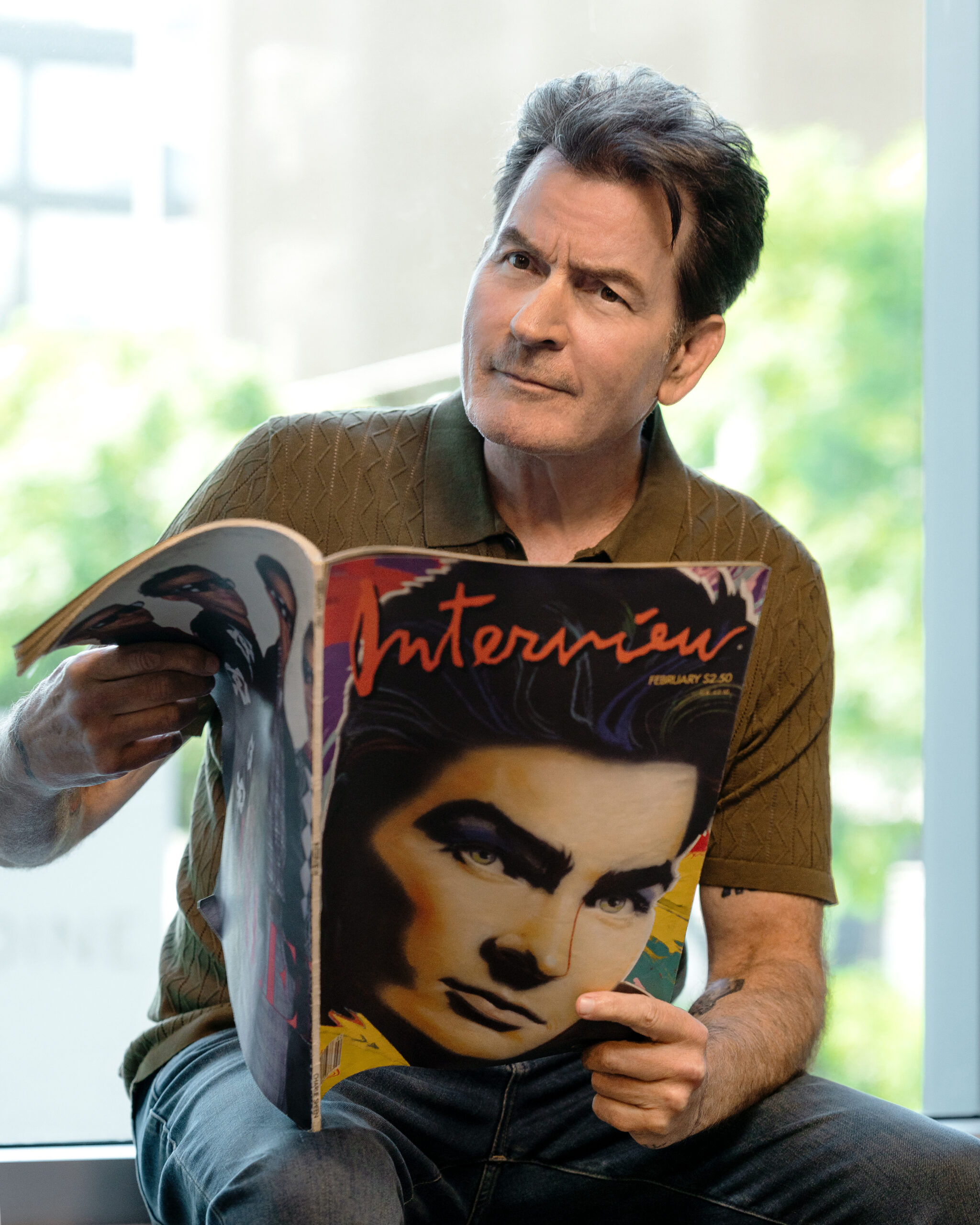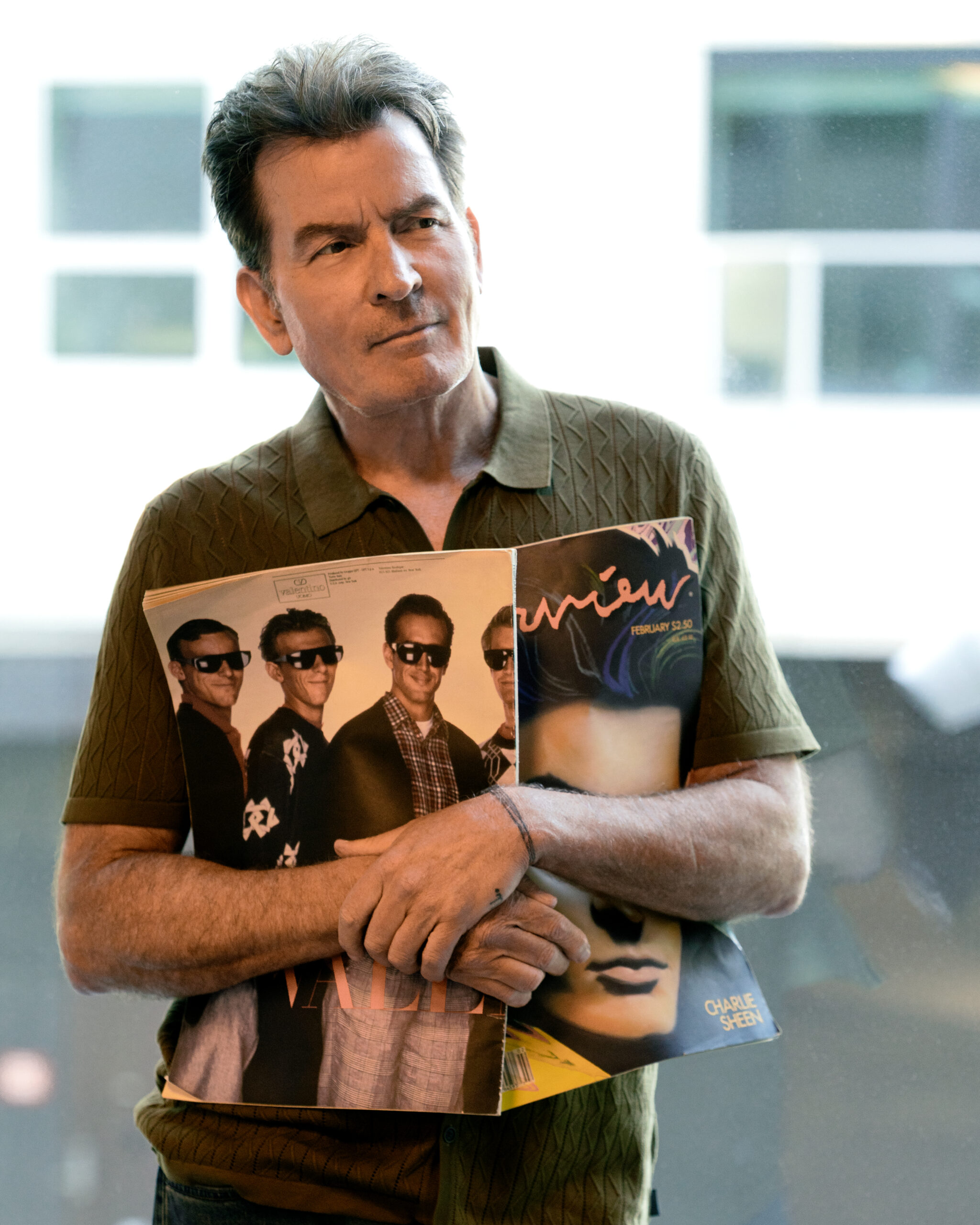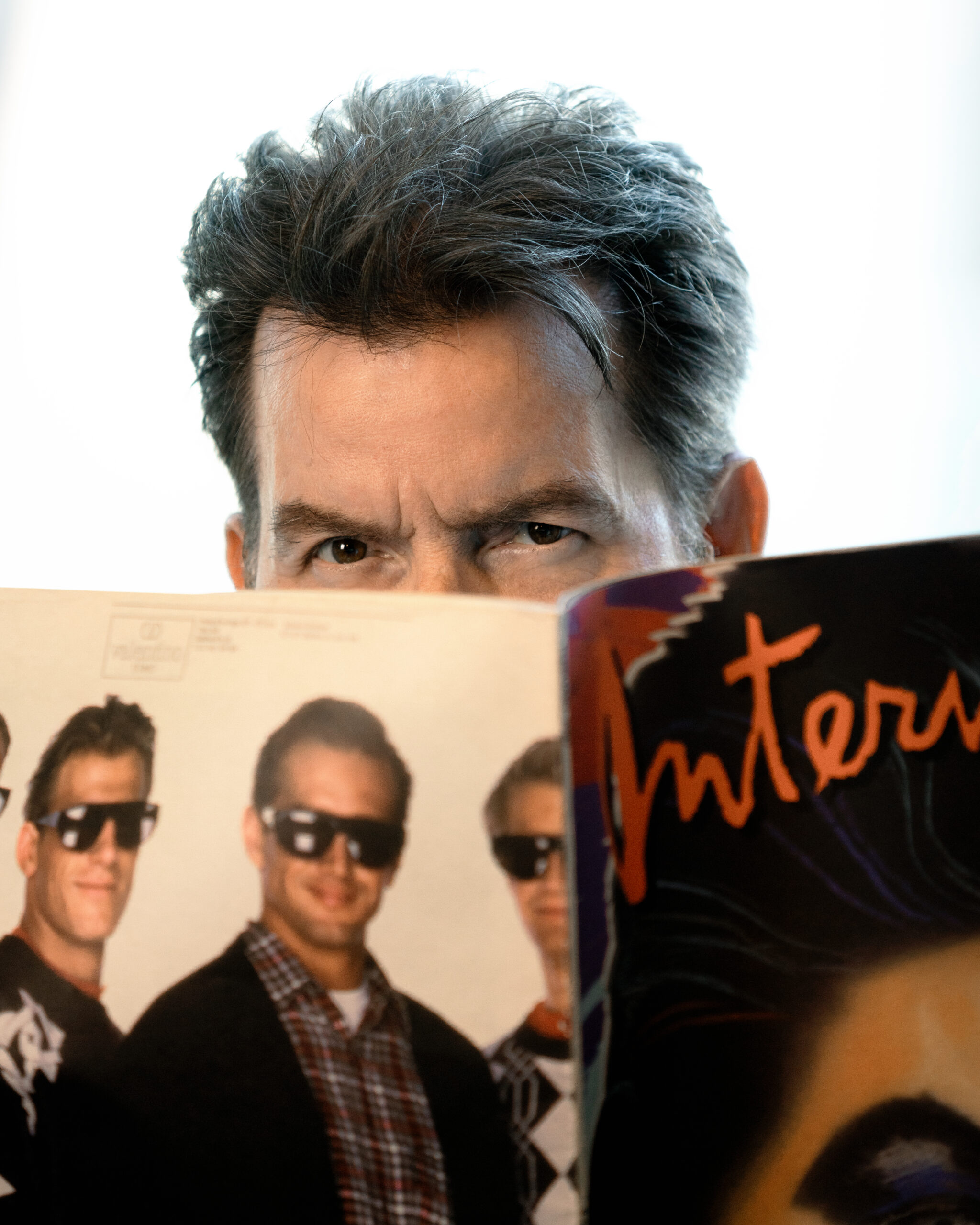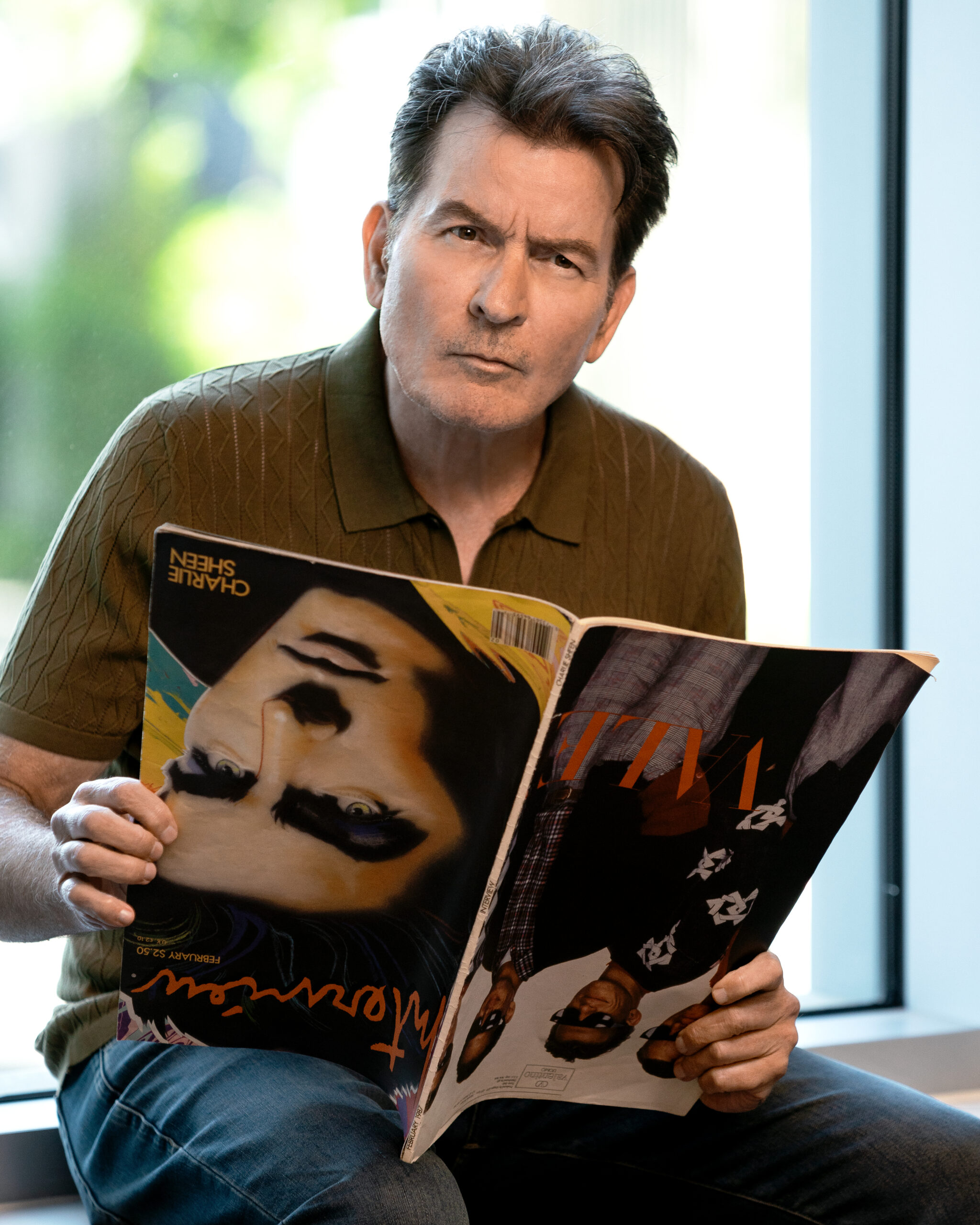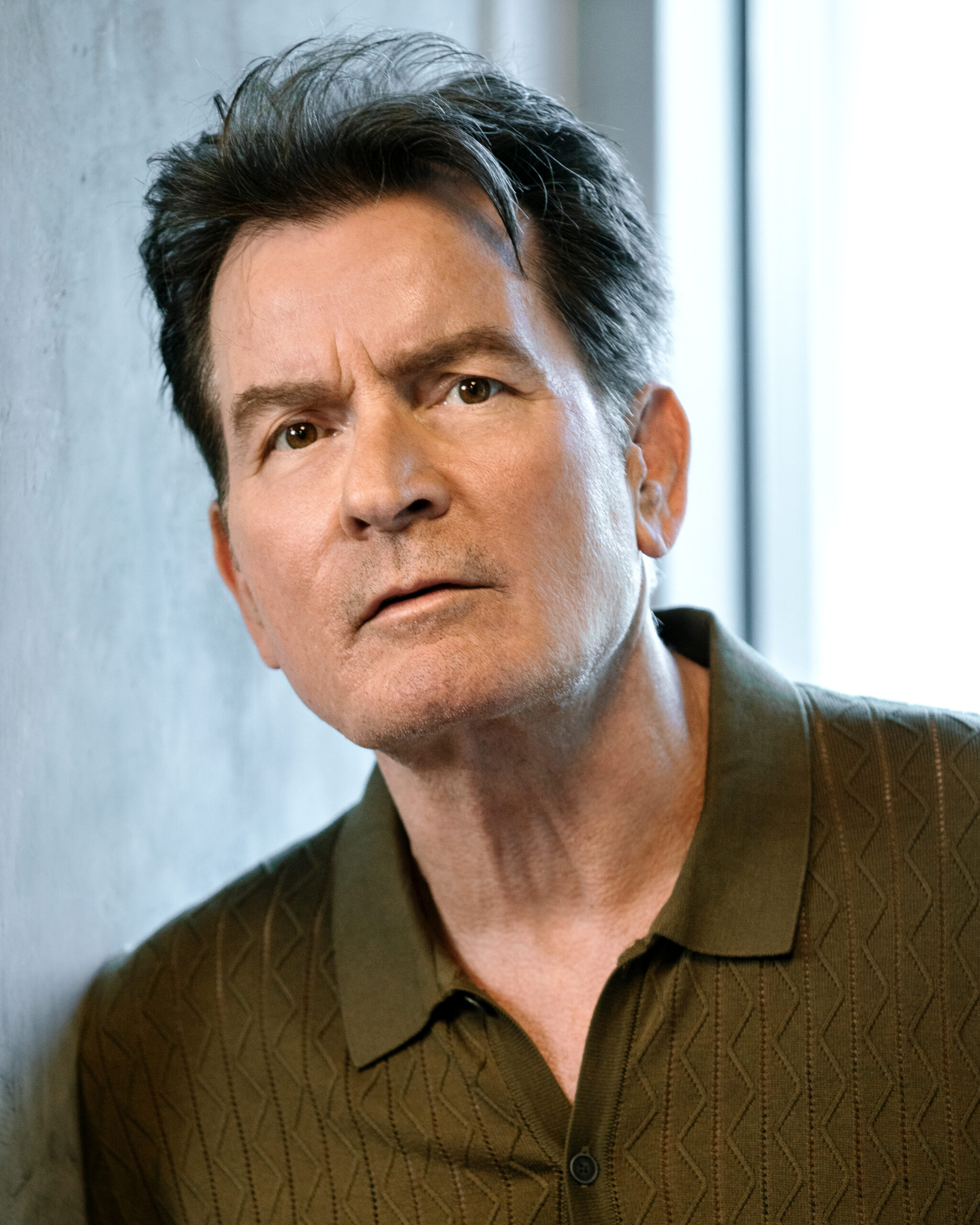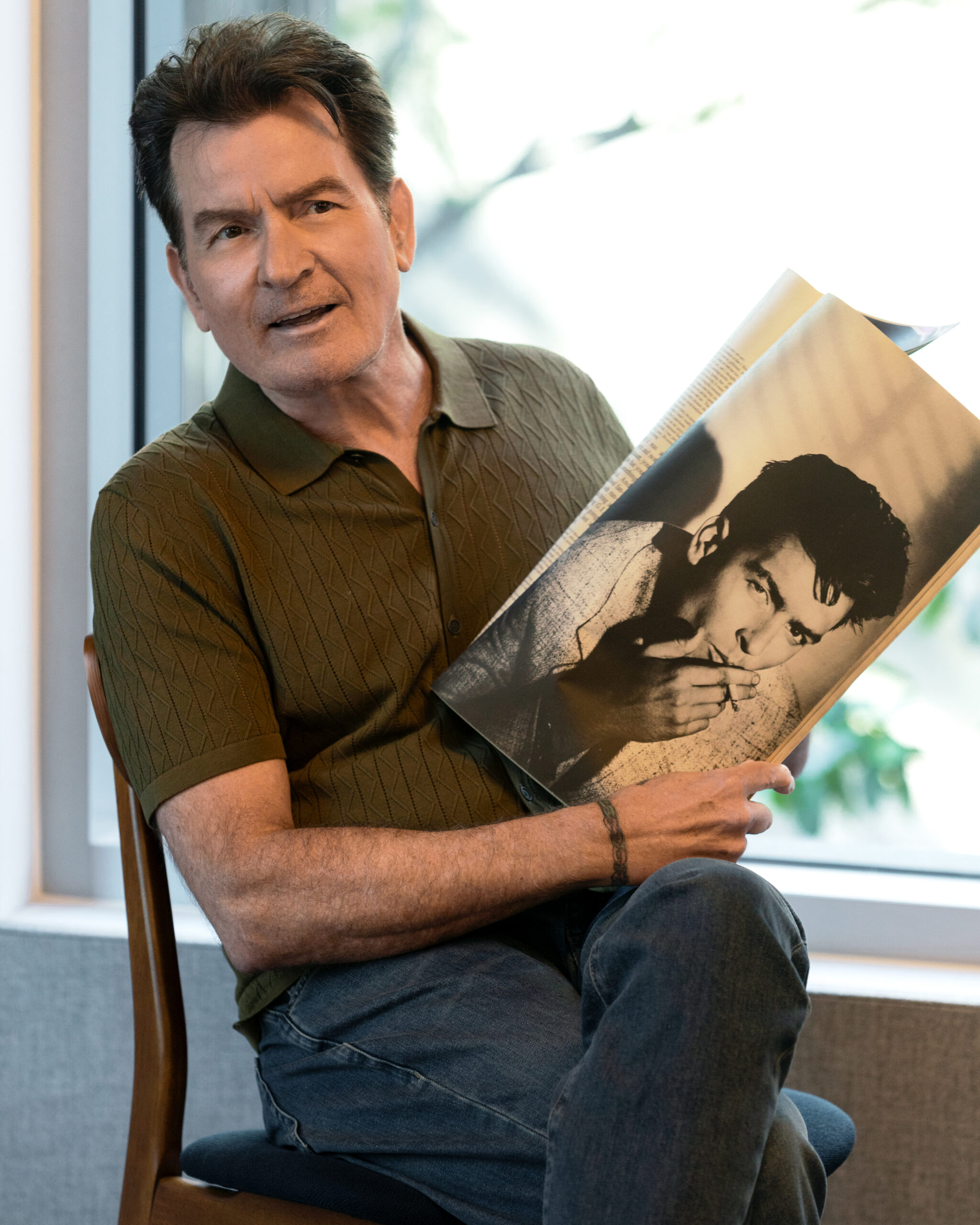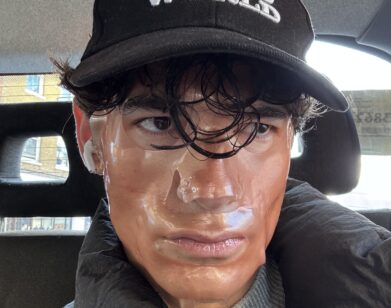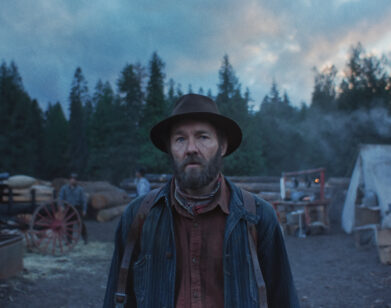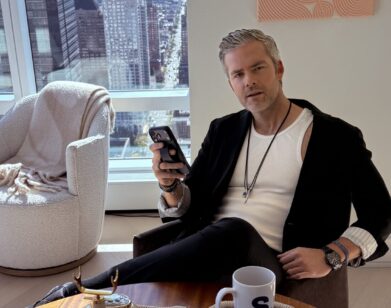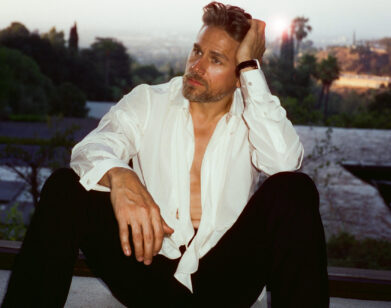BROTHERS
“This Is Not an Apology Tour”: Charlie Sheen, in Conversation With Emilio Estevez
A lot has happened to Charlie Sheen since he appeared on the February 1987 cover of this very magazine, rendered in technicolor by Richard Bernstein and Andy Warhol. At the time, a 22-year-old Sheen was well on his way to becoming one of Hollywood’s most bankable leading men, fresh off star-making turns in Platoon, Wall Street, and Ferris Bueller’s Day Off. More than two decades later, when he was fired from Two and a Half Men in the throes of an ugly and very public battle with drug and alcohol addiction—does “tiger blood” ring a bell?—Sheen was the highest-paid actor on television, earning almost $1.8 million per episode. Since getting sober in 2017, the 60-year-old Hollywood icon has led a relatively quiet life—until now. This week marks the release of The Book of Sheen—a tell-all memoir about his childhood as the son of Hollywood royalty and the fall from grace that followed—plus a hotly anticipated, two-part Netflix documentary, aka Charlie Sheen. But as he told his older brother Emilio Estevez last month, don’t call it a comeback. “I like to look at it more as a reset,” he said, “hopefully with a couple upgrades.” To mark the occasion, we asked Estevez to put his brother on the hot seat, and nothing was off limits. As Estevez declared at the very beginning of their conversation: “The subject of this interview, Mr. Sheen, was not given the questions in advance.”
———
EMILIO ESTEVEZ: Hi, brother Charlie.
CHARLIE SHEEN: Dude, how’s it going?
ESTEVEZ: It’s going, man. How are you?
SHEEN: Good, good, good. Yeah, it’s been a productive day.
ESTEVEZ: Good interviews today?
SHEEN: I think so, yeah.
ESTEVEZ: All right. So the bar’s set pretty high?
SHEEN: Probably higher than normal.
ESTEVEZ: Okay. I’ll try not to disappoint. For the record, the subject of this interview, Mr. Sheen, was not given the questions in advance. Additionally, the interviewer—that would be me—did not ingest any THC edibles before conducting this interview, but he wanted to.
SHEEN: Understood.
ESTEVEZ: So anybody that knows you knows that you have an obsession with the film Jaws. And this year being the 50th anniversary of the film, I couldn’t imagine doing this interview without talking about it. Why did it have such a profound effect on you?
SHEEN: Well, what started it was that you were allowed to see it before I was. If you remember that first promotional commercial that played in the living room on that 12-inch TV that we grew up on, it looked like the type of film that would test our greatest fears and also take us on an adventure that we probably weren’t prepared for.
ESTEVEZ: Right.
SHEEN: Then, when you saw it and came back raving about it, that’s when I knew that now my life had only one purpose, and that was to sit in the movie theater and watch Jaws a hundred times.
ESTEVEZ: That’s remarkable. [Laughs] 100 times.
SHEEN: Yes. But then I started stealing stories from people and making them my own. Glennis Liberty, my first agent, said that when the head comes out Ben Gardner’s boat, the person in front of her jumped so quickly that she got covered with popcorn. So then I would tell my friends, “Hey, man, when the head came out, the guy in front of me covered me in popcorn.”
ESTEVEZ: But that didn’t happen to you.
SHEEN: [Laughs] Didn’t happen to me.
ESTEVEZ: You must’ve been really jealous about this, but I remember taking the bus from Point Dume all the way to Century City and watching it twice.
SHEEN: Wow. I would do the same thing. I would sometimes do three or four showings a day. And people have to understand, this film stayed in the theater for over a year.
ESTEVEZ: Held over in its 52nd week. It’s hard to imagine that now.
SHEEN: It created the “summer blockbuster” as everyone knows it.
ESTEVEZ: Right.
SHEEN: Watching Jaws @ 50, the film holds up in a way that is peerless. It holds up like Apocalypse [Now] does.
ESTEVEZ: Yeah, it does. My only misgiving in watching the doc is that you weren’t interviewed for it. I think that would’ve been a great addition.
SHEEN: Thank you. There’s not a chance you and I could do an interview for anything, even Interview Magazine, and not talk about Jaws.
ESTEVEZ: We’ve ticked that box. All right, because we’re family, people who read this may assume me of lobbing softball questions. So to disprove that, I’d like to ask you about some things that may be more difficult and uncomfortable for you to answer. Are you okay with that?
SHEEN: Why not? Yeah.
ESTEVEZ: The name of your Netflix doc is aka Charlie Sheen, but what is your real name?
SHEEN: Carlos Irwin Estevez.
ESTEVEZ: Now, how many other “akas” do you have? Are you an international spy or a communist?
SHEEN: None. No. And no.
ESTEVEZ: Okay. The last more intimate question I have is about your whereabouts on November 22nd, 1963. Some put you in Dallas Dealey Plaza specifically. Can you finally state for the record where you were on that day?
SHEEN: Sir, I am unaware of any such mission, nor would I be disposed to discuss such a mission if it did in fact exist, sir.
ESTEVEZ: So in other words, you were still in dad’s sack?
SHEEN: Exactly. Are you going to let the audience know that that’s a direct quote from Apocalypse?
ESTEVEZ: That is a direct quote from Apocalypse Now. But let’s get back to the present.
SHEEN: Okay, please.
ESTEVEZ: Looking at your high school grades and attendance record, which you’ve made public in your memoir, you’re not known to be an overachiever.
SHEEN: Not academically—
ESTEVEZ: No, exactly. Why a book and a doc both dropping a day in between each other, and why now? Because that certainly speaks of being an overachiever.
SHEEN: I guess it could be viewed as a moment of overachievement. They happened to align at the exact same time. And while prepping the doc, I started to work on the book. It really wasn’t by design. What was by design was to make the decision to activate both but still not knowing that they were both going to fall into the same orbit like they did. It was an opportunity to take back the narrative, to finally tell my stories as they really happened, as opposed to a lot of the blanks and the events and the things that people have just egregiously filled in over the years.
ESTEVEZ: Right. Truly in your own words, both on the page and on film.
SHEEN: Correct. I made it clear early on with the publisher, with my editor, that if this meant that I was going to have to use a ghostwriter, that I just wasn’t interested. The idea of somebody who wasn’t me telling my stories, starting those sentences with the word I and it’s not connected to my hand, would’ve been counterfeit.
ESTEVEZ: Right, right.
SHEEN: And you read the book. You can feel me.
ESTEVEZ: Yeah, for sure. I feel your word, your brain, as it were on every page. Your hand was specifically guiding the book. But you had to decide on a director to run the ship on the documentary, so that had to be a leap of faith for you as well. It’s like, “Okay, I may like this guy’s work, but can I trust him? Is he going to ask the right questions? Are we going to get too deep on some things, go places I don’t want to go?”
SHEEN: Luckily, he’d done a few docs before he got to me that I could look at.
ESTEVEZ: We’re talking about Andrew Renzi.
SHEEN: Andrew Renzi, yeah. “The Renz,” as I call him. And I thought his work was phenomenal. But I noticed that he hadn’t done a celebrity, an actor-driven doc. The first time I met him, he was in an office, and he says, “Do you have any questions?” I said, “It’s not so much a question as a request, but will you promise me that the first time they see me in the doc the clapboard’s not going to already be in frame and I’m going to sit down into the chair behind it?” And he said, “That will never happen in our documentary.”
ESTEVEZ: It’s kind of an old trope, right?
SHEEN: Because you know the moment I’m talking about.
ESTEVEZ: I do.
SHEEN: Then he and I spent a year together talking about the stories and the different stages of my life and my career and family, extended and otherwise, and the trust grew. That trust has to go both ways. He has to trust that I’m going to be honest and I have to trust that he’s going to capture it gracefully. It really helped the book because he was pulling out of me a lot of stuff I hadn’t thought about in decades. And as we were discussing it, I knew that the book was coming, so I was already adding stuff to the table of contents.
ESTEVEZ: So in some ways, they both fed each other.
SHEEN: It was three days total, probably about 30 hours combined, but it was two days and then there was a couple of months in between that final third day. I feel like my writing hours were scattered. So when I came back to do that final interview session for the doc, you can see that I’m a lot more fatigued than when I first sat down in that diner. But it was a good fatigue because I’d been documenting a lot of stuff on the page.
ESTEVEZ: So you’ve often used the famous quote, “A setback is a setup for a comeback,” but on this promo tour, you seem to be downplaying the idea of a comeback. Is this something else? A reinvention, maybe?
SHEEN: Yeah, that’s a great question. I almost like to look at it more as a reset, resetting the OS, hopefully with a couple upgrades.
ESTEVEZ: Right, right.
SHEEN: When people want to talk about the past and all this other frickin’ shit, I’ll be in a place to say, “Well, you know what? Here’s the great news, buddy. You can watch it. You can read it. You can even listen to it. Here’s your hat trick of choices.” This is not an apology tour. Most of my fifties already were. It’s a bit of a reintroduction because, dude, let’s face it, there’s a lot of people out there that still don’t know my movies, don’t know the early work, don’t know the whole evolution of things. “Oh, he’s the crazy guy with the tiger blood.” I think it’s a moment to just reintroduce myself to that part of my fan base.
ESTEVEZ: I think it’s smart to recalibrate in that way. Celebrity documentaries are like social media pages on steroids, that’s how I see them anyway. I think it’s important to know that the object of the documentary most often doesn’t get to have final cut before it hits the airwaves. You knew this when you signed the deal with Netflix, but because the book is 100 percent in your words, does this make the book a more important document or more representative of your truth?
SHEEN: Yes, it does. Because there’s certain stories in the doc that I can only initiate, and then how they’re supported visually with archival content is completely out of my hands. The doc is fabulous, and I couldn’t be happier with it, but there is a moment where it only scratches the surface of certain stories, where the book then takes you on the rest of the journey with me at the helm, which is pretty frickin’ cool. People are going to say, “Well, I’ve seen the doc. Why should I buy your book?” And I’ll say, “Because there’s more to the story.” In fact, there’s a quote in the book that says, “Just because you’ve reached the bottom of the page doesn’t mean you’ve made it to the end of the story.”
ESTEVEZ: So I’ve watched the doc, as you know, and I just finished the book this weekend. We grew up in the same house. We went to the same schools and acted in films together as adults. But there was so much that I found shocking and surprising in both works. In many cases, I felt like I was an outsider looking in, like I had nothing to do with the Estevez-Sheen family. Like, “Where the fuck was I?” And mom said something similar to me a few days ago after she read the book—she didn’t use the word fuck. But over these two years, as you’ve explored your past, did you ever step back during the process and feel that perhaps your truth was stranger than fiction?
SHEEN: Yes. And only now, because when you’re traveling through space at 18,000 miles an hour, you have nothing relative that tells you you’re going that fast. But somebody on the ground watching this thing streak across the sky, they can see it. Even writing these stories, or telling them on camera, there’s gratitude that the actual guy is still here—and shouldn’t be, probably—to reveal this stuff and invite people into the legacy, so I’m super grateful for that. We’d have these parties that would go on for, I don’t know, six, seven, eight days at a time and everybody was just waiting for the moment. I’m not saying I held hostages, but the kind of parties that were going on, there was no track of time. Time just became something for other people. Does that answer your question?
ESTEVEZ: I think it does. I would watch a lot of it in horror and fascination and then envy, too, because sometimes I wanted to be in that room. I wanted to be at that party but I knew that I couldn’t check my judgment at the door.
SHEEN: I got you.
ESTEVEZ: For many years you said, “Emilio, you’re not a drinker, you’re a sipper.” And listen, there have been some times where I was a drinker and I paid the price for it. But you are absolutely right, I am more of a sipper—which is never a drinker.
SHEEN: Which is why you can still do it with regal aplomb, or something close to that.
ESTEVEZ: My next question is—
SHEEN: But wait, were you ever officially invited when it had gotten to that level? Was the invite ever extended?
ESTEVEZ: No. You asked, you included me. Because at one point in time, I was collecting a lot of fine wines. I was collecting them and you were drinking them. So there was one moment where you said, “Listen, come on up and have a 1945 Château Cheval Blanc.” I was like, “I’ve never had one, so I’d like to come up there and drink it with you.”
SHEEN: Are you sure it wasn’t a Lafite Rothschild?
ESTEVEZ: It might’ve been. But I made whatever excuse I did over the years to not come up there and be a part of the madness.
SHEEN: Got it.
ESTEVEZ: You finally brought one of those bottles over to the house and you said, “I’ve always wanted to share this with you.” So I put it in the cellar and I cherished it for the longest time. And one night I decided to open it. I couldn’t believe the cork was fully intact and I wanted to examine it further. And so in looking at it, I struggled to get it off of the corkscrew and my elbow slipped and knocked the bottle of ’45 over on the countertop. My reflexes were still pretty sharp, so I grabbed what was left of it and saved the bottle from smashing on the floor, but that was as close as you and I got to partying during some of those days.
SHEEN: Wow. How was that first sip?
ESTEVEZ: It was extraordinary. The way it was preserved was unlike anything I’d ever had in a glass before. I don’t know why I remember this, but your house wine was the—
SHEEN: It was the Chagall.
ESTEVEZ: I thought it was the ’82 Poyferré.
SHEEN: No, dude. House wine was the Chagall, the ’70 Mouton Chagall, because I could still get a case back then for 300 bucks a bottle, dude.
ESTEVEZ: Right, right.
SHEEN: So what are we talking? A dime and a half for a case? That’s 30 grand. My house wine would be worth more than my house.
ESTEVEZ: [Laughs] So, we both know the business is changing. The way film and TV is consumed has morphed into something altogether different than when we started out. But by the same token, audiences, especially in the central corridor of the country, are turning to nostalgia for entertainment. So with a show like Two and a Half Men still heavy in syndication rotation, do you think this is a positive sign that we could see a return to three-camera shows in front of a live audience, an arena where you thrived?
SHEEN: I would absolutely agree with that. Deep down, there’s still some emotional connection to what would be the entertainment version of comfort food, chicken soup for a different part of their soul. Because the thing about situation comedies is that there’s always somebody in there that you can relate to from your family. I wouldn’t be opposed to getting back on that horse if the right thing came along. You’re not going to find me with a freeloading brother in a bowling shirt, but something that’s more suited to where I’m at.
ESTEVEZ: No, of course. Something that fits you now, where you’re at now and how people see you.
SHEEN: I would’ve a hard time getting back into—
ESTEVEZ: No dick jokes.
SHEEN: Junior high dick jokes would be hard for me right now. You know what I mean?
ESTEVEZ: I get it. So with the exception of a brief cameo on Two and a Half Men, you and I have not worked together since 1999 in the Showtime flick called Rated X, which not many people saw. I thought you gave an absolutely breathtaking performance, brother, that still gives me chills to this day. And you were gracious to include the experience in the book, which I was surprised to read.
SHEEN: Oh, right on.
ESTEVEZ: I’m often asked if you and I will ever reunite for a film or a TV show. And the question I have is, should we? Have we already ticked that box?
SHEEN: Well, that’s a great question. Aside from the obvious for me, me in Platoon, Wall Street, Two and a Half and you in Young Guns, Ducks, Breakfast Club, Outsiders, Men at Work is the most talked about, mentioned, requested engagement that we get out in the world.
ESTEVEZ: I would concur, yes.
SHEEN: But I’m not saying that that’s the one we jumped back into. But in Young Guns, I died on page 52, I think?
ESTEVEZ: Right. It’d be hard to bring you back for part three.
SHEEN: And thank you for how you spoke to Rated X. Yeah. It’s a shame that one wasn’t made more available to everybody.
ESTEVEZ: You were summarily dismissed for playing yourself when nothing could have been further from the truth.
SHEEN: It’s interesting. The day of my one-year birthday after getting out of Promises, that day on set, I was blasting lines and chugging vodka, and then I go to an AA meeting in Canada where they had a Canadian AA birthday cake. Not many people can claim that story, dope and booze on their one-year.
ESTEVEZ: But let’s be clear, it was fake dope and fake booze.
SHEEN: It was water and powdered lactose, right? That shit still burned though, didn’t it?
ESTEVEZ: Yeah, it did. Well, I know your schedule is tight, so we’ll end this. I want to say thank you for sitting down with me and I’ll see you later at the folks’ house for dinner. Mom asked if one of us could pick up some olive oil from the market on the way over. Do you mind grabbing it?
SHEEN: I guess there’s a bodega on the way home. There has to be.
ESTEVEZ: If you wouldn’t mind, that’d be great.
SHEEN: Did she mention what size she’s looking for?
ESTEVEZ: A medium would probably suffice.
———
Photo assistant: Will Koning

